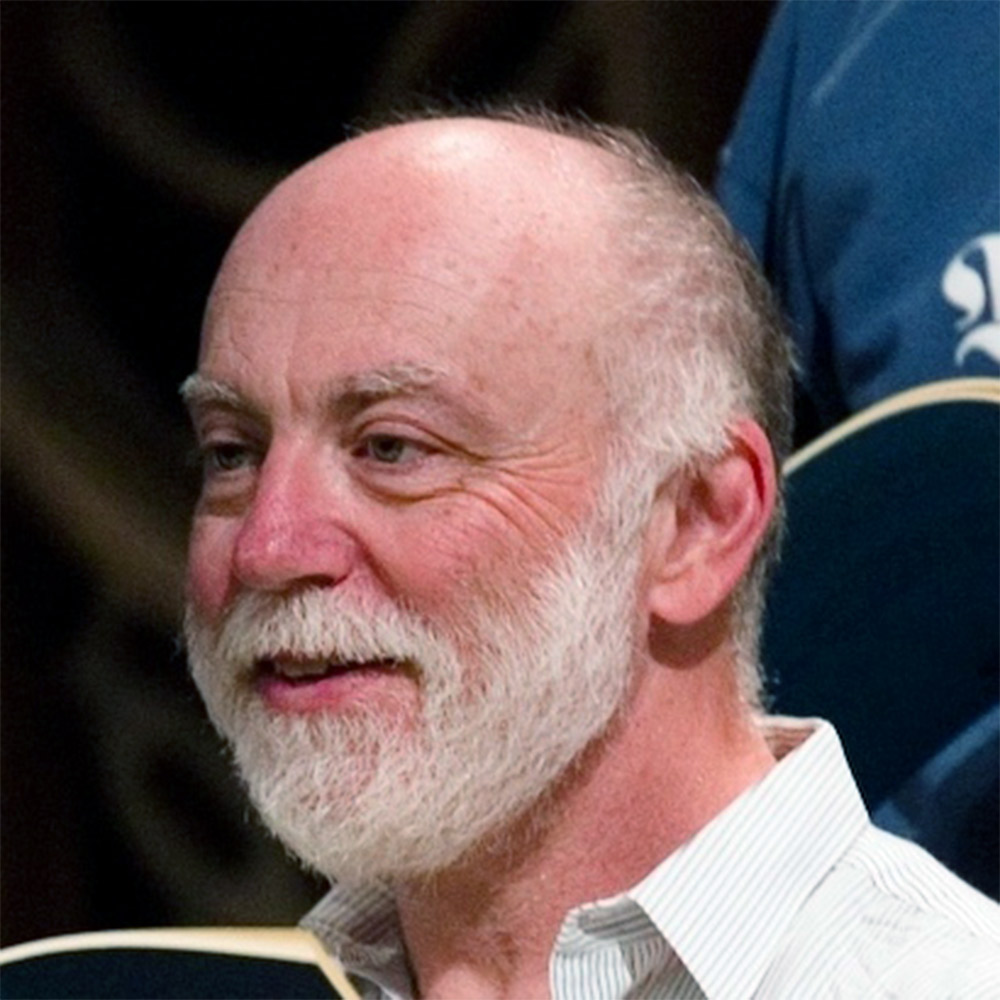
Meet L Peter Deutsch, a native of Cambridge MA, now living in Sonoma County CA. After a long detour through a distinguished career in Computer Science, he returned to composition part-time in 1986, then full-time in 2003. His strengths as a composer include sparkling counterpoint and polyphony, lyrical melodies, fluent text setting, and the use of a large harmonic palette centered around modal scales.
Today, L is our featured artist in “The Inside Story,” a blog series exploring the inner workings and personalities of our artists. Read on to hear about L, the Trio Casals, and their recent performance at the Weill Recital Hall at prestigious Carnegie Hall…
Who were your first favorite artists growing up?
All the adults in the family enjoyed listening to classical music, and that is pretty much all I heard until I was in my teens. I probably heard more Brahms and Schubert than anything else, and when I write more lyrical and traditionally harmonic music, they are my reference point.
My other early hero was J.S. Bach. I learned to play pieces from the Well-Tempered Clavier on my own in high school, and when I started composing seriously much later, a lot of my first music had the flavor of his contrapuntal works.
When did you realize that you wanted to be a composer?
My elementary school, Shady Hill School in Cambridge MA, had a great music program in which every student learned to sing, read music, and play the recorder starting in the early grades. I loved the recorder, and by the time I was ten or so, I was writing short pieces for it; and in going through my parents’ memorabilia a few years ago, I discovered an old school notebook of mine in which I had transcribed a favorite Christmas carol into an arrangement for four recorders. So music creation has been in my blood for over sixty years. It wasn’t until 2002, after I had burned out on my previous career as a software developer, that I realized that I wanted to return to composition as my main creative pursuit.
What is your guilty pleasure?
Pastry, especially if it includes fruit. My favorites are Linzer torte (a dense traditional Central European torte with a ground hazelnut crust and raspberry jam filling, a treat from my childhood), and Mexican triangular pan dulce turnovers with pineapple or apricot jam inside (a staple at many Mexican groceries where I live in California). Carrot and chocolate cakes are on the list, too.
If you could spend creative time anywhere in the world, where would it be?
Paris, France (not Texas!). I lived there with my parents for a year when I was seven, and was pretty close to bilingual until recently. I love the food, the parks, and the museums; they are unique in the world. I’m not sure that I could live there permanently, but I keep going back.
Music is in the culture. One summer, as I was strolling over a bridge on the Seine, I heard a cello playing. I looked down to see a young woman practicing her music in one of the miniature amphitheaters that have been built along the river just for small musical performances.
If you could do any job in the world and make a living at it, what would that be?
I would be the composer-in-residence for a world-class symphony orchestra that had an affiliated world-class chorus and that accepted the fact that I write fine chamber music but don’t have the stamina to write for full orchestra. I have a feeling I’m not the only composer who has this dream, or one like it!
What does MOTO BELLO mean to you personally?
For two reasons, this album is a huge milestone in my career as a composer. This is the first time that any performing ensemble, let alone one of the quality of Trio Casals, has liked a piece of mine that they were hired to record so much that they chose to program it on two of their own concerts.
Second, my work will get amazing exposure through a live performance at the PARMA Music Festival at Weill Hall in New York, the first time my instrumental music will have been performed in a major venue. I have a lot of self-doubt about my abilities as a composer, and experiences like these mean a lot to me as a counterweight.

Trio Casals performing at Weill Hall
What was your most unusual performance, or the most embarrassing thing that happened to you during a performance?
Unusual: my wedding, on a cruise ship in San Francisco Bay, where the ceremony included a chamber chorus performing four songs, two of which were my own work.
Embarrassing: the performance of my commissioned piece “Brethren and Lovers” by the San Francisco Gay Men’s Chorus, on the steps of City Hall, which they stumbled through noticeably despite extra rehearsal time and being partly doubled by additional instruments.
Was there a piece on MOTO BELLO that you found more difficult to compose than the others?
The middle movement of Ocean Air, entitled Evening, was the most difficult and least satisfying to me. It’s based on a piece that I had originally written for brass quintet, and for a different purpose. The opening and closing sections are nearly unchanged, but I went through three completely different versions of the central section before reaching the final one.
Interestingly, I’ve found that the more effort and reworking I put into a piece of music, the less satisfying it usually turns out to be. Morning, the final movement, I practically dashed off, and I like it the best of the three!
What was your favorite musical moment on CORO DEL MUNDO?
I have to say that the more I listen to the two songs on this album, the harder I find it to answer this question. All of our Cuban collaborators did such a good job, start to finish. But if I had to pick one section, it would be the last 45 seconds of Dance to the Revolution, which is kind of a coda after the verses. As the parts build up the texture from bottom to top twice, I imagine one person after another joining the dance, and then all singing the final few bars together.
What does CORO DEL MUNDO mean to you personally?
The recording experience was memorable because I got to spend a week in Cuba (where I had never been) with four interesting fellow composers and also with my husband Michael, who can’t travel much because of his health. It was also a milestone because it was the first time I had worked with an arranger. And, together with my other recent recording with PARMA on their MOTO BELLO release, it was the impetus for me to finally get a decent Web site put together, which could bring my work a qualitatively new level of visibility.
Is there a specific feeling you want listeners to tune into when hearing your work?
Ocean Air is based on a memory of a transatlantic trip on a large cruise ship in the summer. The three movements are intended to evoke how a passenger might feel at different times of day. I’m hoping that any listener who has taken a long water journey, even if it’s only in a small boat on a river, will tune in to memories of it.
Beyond this album, much of my music is inspired by journeys of various kinds. I’m hoping to record my composition Mountain Journey, a suite for brass quintet, sometime in the future, and Sunset at Montelimar, written during a stay in southern France, is planned for a future PARMA release. Stay tuned!


MOTO BELLO and CORO DEL MUNDO now available through Navona Records and Ansonica Records for streaming or purchase. Click here to explore MOTO BELLO. Click here to explore CORO DEL MUNDO.

L Peter Deutsch is a native of Massachusetts, now living in Sonoma County CA, and British Columbia, Canada. He writes primarily for small instrumental or a capella vocal ensembles, spanning styles from devotional to romantic to jazzy, and from Renaissance to early 20th century. Works to date include four choral commissions; releases through PARMA Recordings include music for chorus, string quartet, woodwind and brass quintets, piano trio (featuring work with Trio Casals), and full orchestra.
